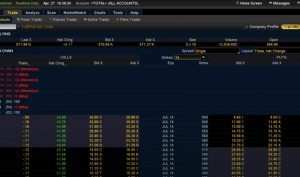 A covered call is an investment in a futures contract where the seller of call options holds the corresponding number of the underlying security, usually stocks or bonds. The price of the call option is based on current market values of the underlying security, at the time of expiration. A call is not a derivative of a commodity, it is just an option that offers the holder the right to purchase or sell a specified quantity of the underlying stock.
A covered call is an investment in a futures contract where the seller of call options holds the corresponding number of the underlying security, usually stocks or bonds. The price of the call option is based on current market values of the underlying security, at the time of expiration. A call is not a derivative of a commodity, it is just an option that offers the holder the right to purchase or sell a specified quantity of the underlying stock.
Futures contracts are contracts between parties whereby both parties agree to buy or sell specific quantities of commodities at specified times in the future. For example, if a farmer agrees to buy corn at a certain price in one year, he or she can then sell that commodity at the same price two years later.
It is very common for people to buy and sell different commodities during their lifetime. There are also many investors who purchase futures contracts to purchase commodities like oil, agricultural produce, gold and silver. Those who are interested in commodities should be careful in selecting the right company to purchase their futures contracts with because some companies do not pay off their contracts if they become unprofitable in the future.
There are three types of calls, one called an Over-the-Counter Call, Over-The-Counter Put and Over-The-Counter Call Spread. These call types are traded over the counter or OTC. Most investors buy OTC covered calls to buy commodities that they will resell later.
Option trading is where the buyer and seller enter into an agreement to buy or sell a specific quantity of a commodity. An OTC contract can be purchased at a discount from the seller. In most cases, the buyer must have a minimum margin on the transaction.
Option trading is a risky investment, since it involves a lot of money, not to mention the risks of losing all of your money. Since option trading is not regulated by the Commodities Futures Trading Commission, it is possible to lose a lot of money.
Covered calls are not considered to be an option. If the value of the underlying asset decreases, the value of your covered option is increased. However, if the price of that commodity increases, the value of your covered option is decreased.
The Covered Call option has been used by traders for decades to create a profitable position, while at the same time allowing them to invest a low margin. The advantage of investing in covered calls is that they are not considered to be gambling.
Many people are now using covered calls to trade with financial institutions and other third parties. Investors usually use this strategy when they own shares of stocks or bonds, commodities, foreign currencies or commodities and stock indexes. The covered call strategy is also used to create a position in the Forex markets.
Traders in the commodity futures markets also use this strategy to profit from the movement of commodities. Because commodities have a limited price range, they are always highly valued in the commodity futures markets.
You may want to consider trading covered calls in both the stock market and the commodity futures markets. The covered call strategy has proven to work very well in the stock market.
This strategy allows you to buy the underlying asset at a discounted price and sell the option at a discounted price in order to profit from the movement of the underlying asset. When you sell your option, you also get to gain cash.
You can sell your covered call when the price of the underlying commodity increases. When you buy the covered option, you can either increase the value of your option by selling the underlying commodity at a lower price or you can increase the value of your option by buying another asset at a higher price. You do not have to worry about the price increasing when you buy the option because it cannot decrease no matter what happens.